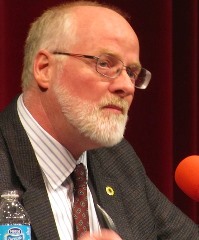
by Mary Rupert
An effort to waive utility payments that the T-Bones owe the Board of Public Utilities was rejected last week at a BPU board meeting.
David Alvey, a BPU member who is running for mayor, made the motion, which passed 5-0, at the BPU meeting to reject the bailout request.
According to Alvey, the Unified Government asked the BPU to forgive $172,700 of $314,000 that the T-Bones owes the BPU for electricity and water over the past few years, and the UG also asked the BPU to provide the T-Bones with a special rate of 6.5 cents per kilowatt hour in the future.
“If people really want the T-Bones to survive, they need to go out and buy tickets and buy beer,” Alvey said. “That’s how a business makes it. I do not believe the BPU should subsidize it. We would not have this relationship with anybody else in the city. I don’t know of anyone in the past who had this much past due forgiven and was given a special rate.”

Alvey said he believes the proposal was not fair to the BPU’s ratepayers. The BPU will eventually shut off power to poor people who do not pay their bills, and if it has another policy for businesses, it’s not fair, he believes.
Alvey said it isn’t for the BPU to decide which businesses make it and which ones don’t. There are other businesses that can’t pay their utility bills, and the BPU doesn’t get to decide which ones are successful.
Alvey thinks the UG may next propose to pay the utility bill, or part of it, through its funds. He said if the UG decided to pay the T-Bones’ utility bill, he would protest that as a taxpayer. He said he doesn’t think it’s the UG’s job to subsidize businesses with his tax money. If he were elected mayor and the issue comes up in the future to the UG, he said he would not support subsidizing the baseball club.
Alvey said he met with the UG about three weeks ago, and he was told then by the UG that the T-Bones had not tried to find private financing. “If private money wasn’t solicited, why was it brought to BPU ratepayers?” he asked.
A spokesman for the Unified Government, Edwin Birch, sent out a statement and response: “The T-Bones Baseball organization is leasing a tax-exempt, government-owned facility. The UG seeks to ensure its facilities continue to be used for the benefit of our Wyandotte County – Kansas City, Kansas, community. The UG has explored various scenarios as it relates to utility payments, but ultimately no changes have been approved yet.”
David Mehlhaff, BPU spokesman, confirmed that the BPU vote last week to reject the request was unanimous, and he confirmed that the T-Bones, not the UG, owe the utility payments to the BPU.
UG Commissioner Mike Kane, when asked about the BPU’s vote on the T-Bones, said, “Can you blame them?”
Kane said that the UG has helped the T-Bones before. The UG bought the T-Bones stadium three years ago, but the agreement with the T-Bones states that the T-Bones will pay the utility bills.
“It’s extra difficult when we shut off other people’s electricity that have lived here years and years,” Kane said. He didn’t recall other businesses whose electric bills were waived.
He said he heard about the bailout effort earlier in some private “three-on-three” meetings that the UG held with three commissioners at a time. If it comes before the UG Commission for a vote on whether the UG will pay the T-Bones’ electric bill, they would have to show him something really compelling for him to vote for a waiver of the electric bills, he added.
This is not a sign that tourism at Village West is having problems, according to officials. While she did not have a specific comment about the issue of the BPU and the T-Bones’ utility bill, Bridgette Jobe, executive director of the Kansas City, Kansas, Convention and Visitors Bureau, said, “The T-Bones are a great attraction for Kansas City, Kansas.”
Tourism in the Village West area of Kansas City, Kansas, is “doing great,” Jobe said.
“We have one of the highest occupancy rates at our hotels in the metro area, and we are always in the top two or three in the metro area for our average daily rates,” Jobe said. “A lot of people are staying here and they’re willing to pay more money to stay here. Our hotels are full in the summer months, many times it’s hard to find a room. Our attractions are doing well. If you look at a Sporting game, or Schlitterbahn just opened up – it wasn’t the best weather weekend – but people are continuing to come here and they are continuing to come back.”
She added it’s very early in the season for the T-Bones, and the weather wasn’t the best for the first games, but in general, tourism is doing well in the Village West area.
There was no response from Kansas City, Kansas, Mayor Mark Holland’s spokesman for this story.
Alvey’s motion at the BPU meeting:
“As the members of this Board are aware, the Unified Government has asked the BPU to forgive $172,700 of the $314,000 that the T-Bones owes the BPU for power and water over the past several years.
“Additionally, the Unified Government has asked the BPU to provide a special rate to the T-Bones going forward, of just 6.5c per kilowatt hour. That rate would not even cover the cost of producing or distributing the electricity, so the BPU would, in effect, be subsidizing the T-Bones on the backs of our other ratepayers.
“When this proposal was brought to our attention, I expressed my concerns, as I know other members of the Board did as well, that this proposal is not fair to our ratepayers.
“First, three years ago the Unified Government agreed to purchase the stadium from the T-Bones because the T-Bones was not making enough money to pay all of the expenses for upkeep. I asked Don Gray at that time, and Doug Bach, if the BPU would now have to provide free power and water to the stadium because it would now be owned by the UG; we all know that the BPU already provides over $7m in free utilities and services to the UG each year. I was assured that BPU would not be providing free utilities but yet, here we are, being asked to provide a subsidy to the T-Bones.
“In our meeting with UG just three weeks ago I asked if the T-Bones had tried to find private financing for their operations. I was told that they had not: one has to wonder why private pockets were not tapped by the T-Bones. And if private money wasn’t solicited, why was it brought to BPU ratepayers? What do the ratepayers get out of the deal?
“Third, as far as I know, if any other business or resident were to be this far in the hole to the BPU, we would shut off their utilities. We all know people, many of them poor or elderly or on fixed incomes, who have had their power shut off. It is clearly unfair to not enforce our policies on everyone in the same manner.
“Moreover, I can name at least three businesses that have gone out of business in the past couple of years, who could easily make the claim that if they had been given this same kind of deal from the BPU and the UG, that they might still be open. How can we claim to be fair and transparent when others do not get this kind of deal, or even know that such a deal was possible for them?
“I have been told that the UG has now changed their proposal, but not by much: the T-Bones would still get the special rate of 6.5 c/kwh, but that the Unified Government, that is, the taxpayers, would make up the difference between what the electricity actually costs and what the T-Bones can pay. So, the BPU ratepayers would not be subsidizing the T-Bones electricity, but the taxpayers will. If that is what the UG wants to do, that is their business, but as a taxpayer I protest.
“Moreover, the new proposal, as I understand it, is that the BPU would still forgive $172,700 of the amount the T-Bones owe from previous years. In my conversation with Don Gray, our GM, I expressed my opposition to agreeing to wipe out that debt. I understand that this decision may be at the discretion of the GM, and I respect that; however, I think the public needs to know what stand the members of this Board is taking on this proposal.
“So at this time I am asking for a sense of the Board. I move that it is the sense of the Board that we oppose providing the T-Bones a special rate for electricity that is not currently available through existing Board policies, and I further move that it is the sense of the Board that the T-Bones pay for their past due utility bills, and that all applicable policies and procedures be implemented in regards to their past due account.
“Finally, I think this is important so that our General Manager can clearly and consistently communicate to the UG the position of this Board. We are elected to this Board to represent the ratepayers and to provide reliable power and safe water, at the most affordable cost, to our ratepayers. I for one did not commit myself to subsidizing a failing business on the backs of the other ratepayers.
“Folks, if you like the T-Bones and want them to succeed, then go out to the stadium buy a ticket and beer and concessions. That is how this should work.”

